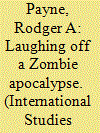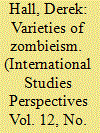|
|
|
Sort Order |
|
|
|
Items / Page
|
|
|
|
|
|
|
| Srl | Item |
| 1 |
ID:
109873


|
|
|
|
|
| Publication |
2012.
|
| Summary/Abstract |
The International Health Regulations (2005) gave the World Health Organization a central role in collecting biosurveillance data and explicitly recognized the importance of human rights for the first time. Human rights and biosurveillance have a complicated relationship with one another though. Surveillance systems are necessary in order to arrest the spread of infectious disease outbreaks, but these same surveillance systems can be used in discriminatory ways. Is some sort of resolution or detente possible? This article investigates the role of the World Health Organization in implementing these potentially competing imperatives contained within the International Health Regulations (2005). To understand this relationship, it examines how the World Health Organization would implement the International Health Regulations in case of an international zombie outbreak.
|
|
|
|
|
|
|
|
|
|
|
|
|
|
|
|
| 2 |
ID:
155294


|
|
|
|
|
| Summary/Abstract |
In recent years, many international relations scholars have been discussing films, books, and television programs featuring zombies, largely because such narratives are thought to provide a compelling metaphor for thinking about a diverse array of contemporary threats. These range from relatively traditional threats posed by violent terrorists to nontraditional threats from epidemics or mass migration. However, because zombie narratives are generally apocalyptic, employing them can provide a misleading and dangerous understanding of international security. By contrast, satirical and comedic zombie stories provide interesting alternative narratives that coincide with the emancipatory objectives of critical security studies. Satirical narratives focusing on elites characteristically critique these powerful figures, often revealing them to be self-centered buffoons. Indeed, satire and black comedy can be quite subversive, reflecting critical and potentially transformative notions—about threats and other dimensions of security politics. Comedies typically center upon ordinary people, emphasize their regular lives, and end happily—aligning with the aspirations of the human security agenda.
|
|
|
|
|
|
|
|
|
|
|
|
|
|
|
|
| 3 |
ID:
146614


|
|
|
| 4 |
ID:
145737


|
|
|
|
|
| Summary/Abstract |
A global zombie outbreak constitutes a hypothetical event in world politics that could likely lead to the collapse of civilization. At the same time, the very threat of such a global catastrophe offers a unique experimental terrain on which to investigate various possible changes and developments in human interaction in social, economic, and political processes. In this article, we discuss our experience with using a global zombie outbreak-based simulation in International Relations teaching and our attempt at measuring the learning outcomes, taking our point of departure in the existing literature on active learning. Following an outline of the objectives, setup, and parameters of the simulation, we evaluate the results of the survey we conducted of the student participants and discuss the learning outcomes discerned.
|
|
|
|
|
|
|
|
|
|
|
|
|
|
|
|
| 5 |
ID:
102936


|
|
|
|
|
| Publication |
2011.
|
| Summary/Abstract |
This paper argues that the frequent references to zombies in analyses of the recent global financial crisis can be harnessed as a "teachable moment" for students of Comparative Political Economy. I claim that two zombie movies in particular-Britain's 28 Days Later and Japan's Wild Zero-can be viewed as if they were allegories of two different national forms of capitalism that are integrated into, and affect, the global political economy in different ways. While 28 Days Later displays remarkable similarities to Marxist accounts of the origins and dynamics of capitalism in England, Wild Zero can be seen as an account of the post-1985 dynamics of the Japanese political economy and its engagement with Asia. This paper gives concrete suggestions for the use of zombie films in the classroom. It concludes with the argument that these two films help to explain why references to "zombie capitalism" cross ideological lines.
|
|
|
|
|
|
|
|
|
|
|
|
|
|
|
|
| 6 |
ID:
119406


|
|
|
|
|
| Publication |
2013.
|
| Summary/Abstract |
Interest in zombies is booming across campuses. International Relations (IR) scholars have likewise begun to pay attention to the undead, as the zombie invasion scenario-envisioned in a variety of movies, television shows, and books-brings to bear many of the key issues and controversies of international relations theory. Here I provide some concrete suggestions for incorporating zombies into undergraduate classes. Drawing from a leading book in this genre (World War Z), I sketch out some of the ways that the zombie wars can be applied to key issues taught in introductory-level IR classes. I then provide specific suggestions to incorporating these insights into the classroom, including discussion guides and simple role-playing exercises.
|
|
|
|
|
|
|
|
|
|
|
|
|
|
|
|
|
|
|
|
|